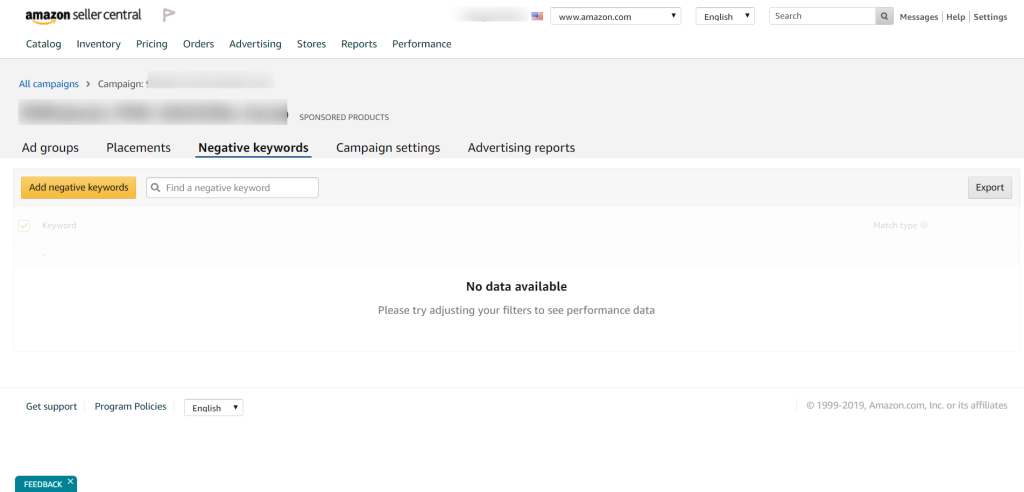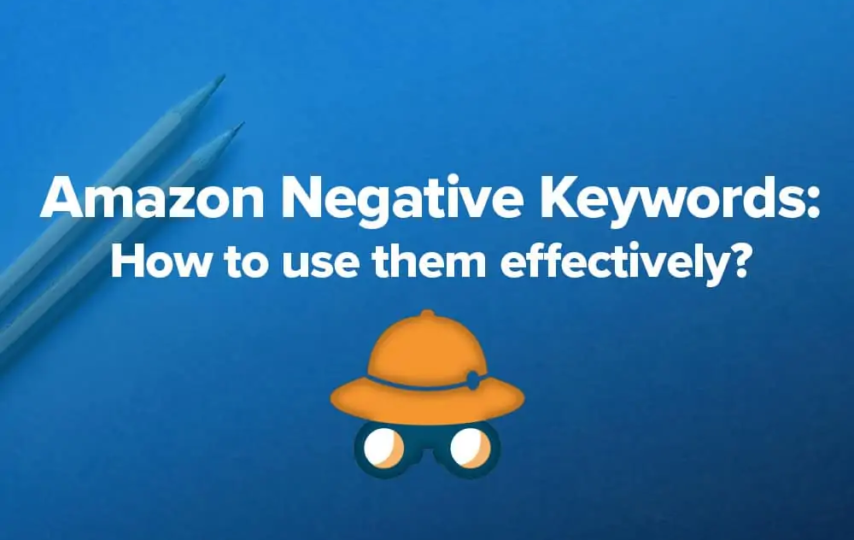If you want to take advantage of negative keyword targeting for your amazon ads campaigns, this article will be helpful to you. So let’s find out now!
Running Amazon PPC campaigns can be expensive. Negative keywords are an effective tool to reduce costs without affecting the performance of campaigns. By using them, you can prevent your ads from appearing on irrelevant or low-priority search queries. To take advantage of negative keyword targeting, you need to identify the correct search terms and add them to your negative keyword list.
In this article, you will be explained how to identify negative keywords and use them to minimize ad spend and improve the performance of your campaigns. Let’s get started!
What Are Amazon Negative Keywords?
In general, negative keywords are the same between Amazon and Google Ads. Simply put, negative keywords prevent your ad from being shown for unwanted keyword phrases. You can create Amazon negative keywords at the campaign or ad group level.
These keywords help to:
- Target your ads to the most relevant searches
- Increase conversions
- Optimizing click-through rate
- Reduce advertising costs for unwanted clicks
- Increase ACoS
- Save your budget
To improve your ad campaign performance, you need to match these negative keywords with the right match type.
What Is Amazon Negative Product Targeting?
Thanks to using negative keywords, it is possible to block all searches unrelated to your product. That means Amazon negative product targeting can block brands or products that are not related to you.
For example, you have a shoe brand called “G Dragon” and have a souvenir brand with the same name; Of course, those who are looking for souvenirs won’t want to buy shoes. In this case, negative product targeting would be beneficial.
Negative product targeting will help to:
- Prevent you from wasting advertising costs on irrelevant keywords
- Separate you from brands that are not your direct competitors
- Increase CTR, conversion rate and ACoS
How to Find Amazon Negative Keywords
It is best to use the Search Term Report to find the right negative keywords. This way is very effective in helping you to know which keywords are costing you.
Let’s start with finding keywords that are unrelated to your items. For example, if your cat food ad appears in a search for “cat collars,” you should add “cat collars” to your negative keywords. Of course, this method will take a lot of time, especially if you are running many advertising campaigns.

Next, you will need to use Excel Sheet. Specifically, from the Search Term Report, you need to choose sorting by highest “Impressions.” As a result, the Search Term Report displays the most popular search queries. Then sort the sheet by highest “Spend” to see which keywords are wasting your money.
After that, let’s look at each search term’s Click-Through Rate (CTR) and Conversion Rate. So If the search term has a high CTR but a low conversion rate, chances are it’s not a relevant keyword for your product. The last thing you need to do is add such search terms to your Negative Keywords list.
How to Use Negative Keywords
At Campaign Manager, click on the campaign where you want to add negative keywords. Next, click on the “Negative keywords” tab and add any terms you want to exclude. Please don’t forget to click “Add Keywords” and save.

There are two options of negative keywords: Campaign and Ad Group. If you add a negative keyword at the campaign level, it will automatically be added to all your campaigns and ad groups. On the other hand, if you choose the ad group level, the negative keyword will only be applied to the specific ad group.
For Amazon ads, negative keywords are available with Phrase and Exact matches.
For Phrase negatives, your ad will not show on search queries that include specific terms in the same order. For example, if your keyword is “Natural Shampoo.” If a customer searches using the terms “Baby shampoo” or “Cheap shampoo,” your product will not appear on these search terms.
For Exact negatives, your products will not show on certain words or phrases if entered correctly by the customer. Like the above example, if your keyword is “Natural Shampoo,” your ad will not show if the customer enters this exact phrase in the search bar.
Frequently Asked Questions
1. What is negative exact?
With negative exact, you can prevent ads from appearing on searches with exact keyword phrases. However, your ad can still show for searches that include your keyword phrase with other words.
2. What is the difference between negative targeting and negative keywords?
Overall, both negative product targeting and negative keywords serve the same purpose of excluding unwanted and irrelevant clicks.
Negative keywords help you block all searches unrelated to your product and target your products to the most relevant searches.
Meanwhile, negative product targeting helps prevent you from wasting advertising money on irrelevant searches, separate you from brands that are not your direct competitors, Increase CTR, and more.
3. What is negative keywords example?
As an example, when you add “nature shampoo” as a negative keyword to your campaign or ad group, your ad will not or will be less likely to appear for keywords containing “nature shampoo.”
Specifically, for phrase negatives, your product will not appear on search queries that include specific terms in the same order, like “baby shampoo” or “cheap shampoo.”
For Exact negatives, your products will not show if the customer correctly enters “nature shampoo.”
4. Am I required to use negative keywords?
The short answer is no. However, you will face many disadvantages if you do not use them.
Conclusion
Overall, by adding negative keywords, you can save on advertising costs. What’s more, it makes every click more meaningful. As a result, they can increase conversion rates.
Are you ready to get good results from Amazon advertising but not sure how to get involved? Then, let’s work with a reliable Amazon marketing agency to maximize success and minimize costs.
Hopefully, through this article, you can better understand negative keywords and take advantage of them for your advertising campaigns. Thank you for your reading!





